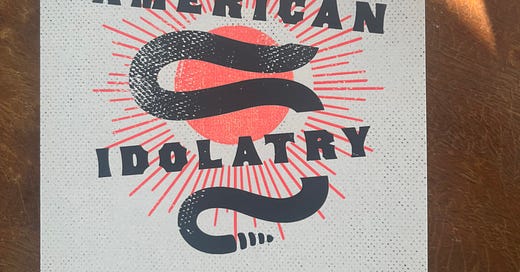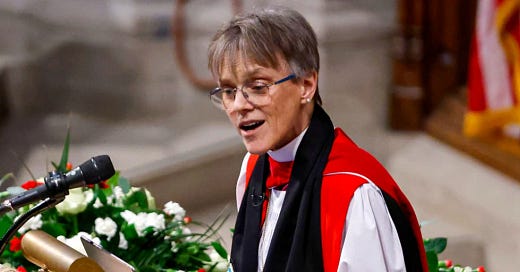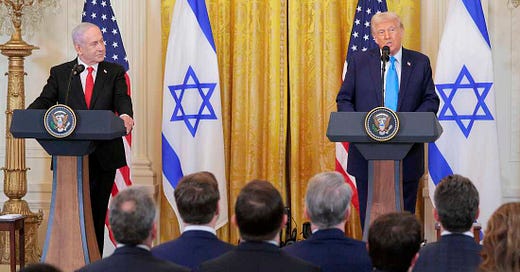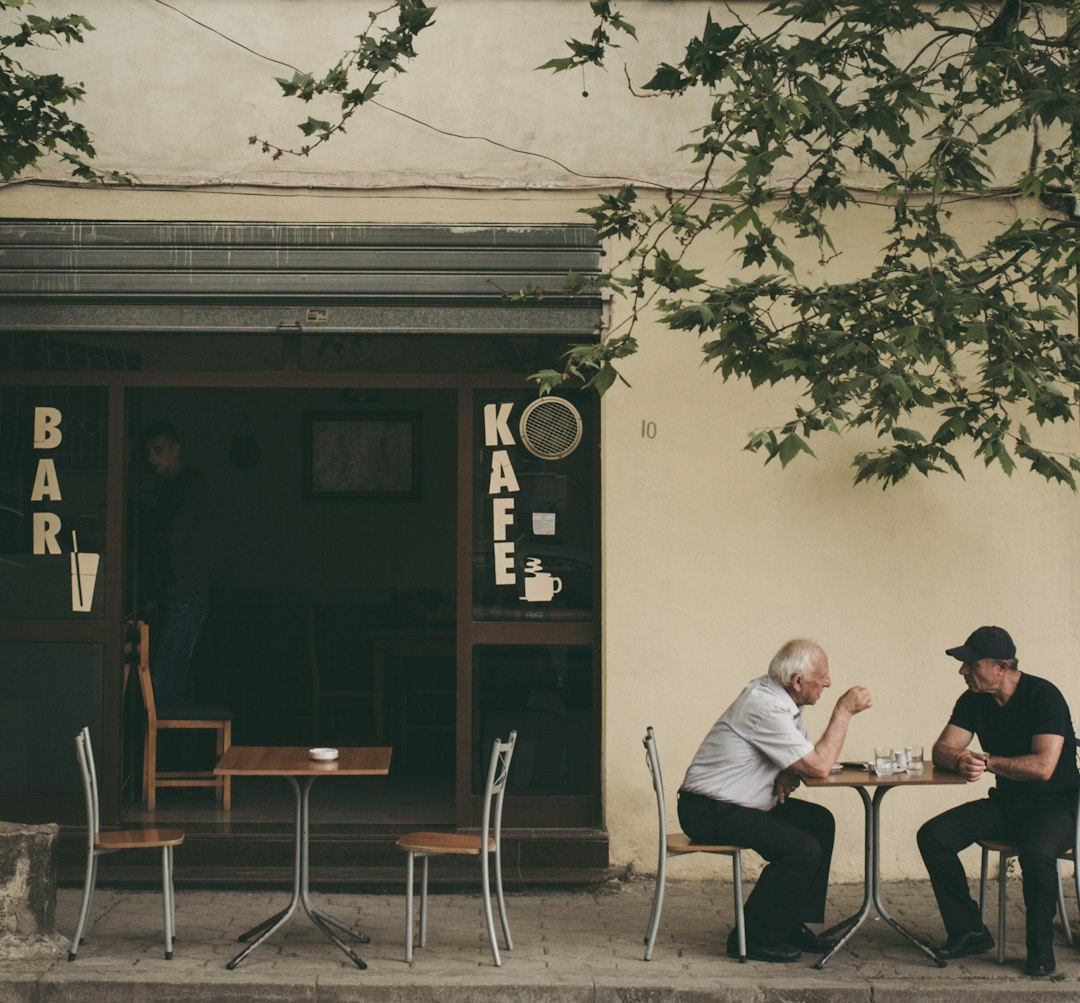
american idolatry: a conversation with andrew whitehead
how christian nationalism betrays the gospel and threatens the church
In recent weeks, I’ve begun to notice the uneasy fog of a new election cycle drift over the news cycle, social media, and regular conversations. Empathic muscles have begun to tense, bracing for the inevitable punch of this brute political process.
Fortunately, we don’t have to navigate such times alone. Although the American church has long struggled to navigate the tension between religious belief and public action, there are faithful saints who arise to help us learn from the past, understand the present, and work towards a better future. Andrew Whitehead is one of these saints.
In his new book, American Idolatry, Dr. Whitehead helps readers frame the rejection of Christian nationalism beyond partisan platforms by appealing to the life and teachings of Jesus.
In the conversation below, Dr. Whitehead and I talk about a number of themes in his book including the public witness of the church, the communal reality of salvation, the task of “winning,” and the role of institutions and individuals in seeking a common good.
Andrew L. Whitehead (PhD, Baylor University) is associate professor of sociology at Indiana University-Purdue University Indianapolis, where he codirects the Association of Religion Data Archives at the Center for the Study of Religion and American Culture. He is the coauthor of Taking America Back for God: Christian Nationalism in the United States, which won the 2021 Distinguished Book Award from the Society for the Scientific Study of Religion. Whitehead has written for the Washington Post, NBC News, Time, and Religion News Service and speaks frequently about Christian nationalism.
The following transcript had been edited for length and clarity.
Amar: The majority of Christian nationalists that I know of— people who would either vocally call themselves Christian nationalists or those who hold nationalist sentiments but maybe wouldn't use that language to describe themselves—will argue their actions are based on a “biblical worldview,” or that they have “Bible-based” motivations. This approach to appeal immediately to a source that we both see as authoritative is one I find hard to have a charitable conversation with.
How do you respond to folks who claim that Christian nationalism is the biblical path? And, what does this mean for the way that we practice and live out our Christian faith in the public square with others who use the same beliefs to different consequences than ourselves?
Andrew: That’s a great question and it really gets some of the broader changes that we've seen across Christianity in the US over recent decades and really centuries too. Some of these things that have been happening—especially since the 1970s, and then with the rise of the Christian right in the eighties, and then the response to that in the 1990s—is what some scholars have called the great abdicating, where we see the dramatic rise in the religious nones. We have these folks who no longer affiliate with religious traditions. It has grown from around 8% in the mid-90s to over 20% now (and is still hovering around 24%).
These broad shifts and changes around what it means to be religious (or Christian) and how we interpret and use the Bible relate to our shared American civic life. We have Christians who say “We need to get the right people in positions of power because we know that God wants A, B, and C to be true about the United States…Here is the biblical support for it in these passages. So now we need to go and do it.” The logic they're working from is that if the US is blessed by God, the only way to stay in that blessing is to do what God says; and since we have what God says, then we need to go and take control.
The logic they're working from is that if the US is blessed by God, the only way to stay in that blessing is to do what God says; and since we have what God says, then we need to go and take control.
But we are looking at a promise that wasn't even realized at the dawn of the United States. This idea of religious liberty, religious freedom, justice for all, and that all men are created equal really just meant white Protestant men. It didn't mean women, it didn't Africans that were enslaved, and it did not mean Native Americans who were here originally, right?
But through the history of the United States, we are hopefully trying to live into that promise. Part of this is the idea of a liberal, pluralistic democracy where we have different groups with different visions for a common good and the flourishing of all. In order for a healthy democracy to function, we need to be able to share a common rulebook of how we're going to interact and how we're going to make decisions that impact each other.
It isn't as though Christians should not play a role in this. In fact, they should and must if we're going to be a part of the common good and a part of civil society. The Bible which Christians take seriously offers us wisdom on how to envision the common life. But again, if we're going to live in a pluralistic democratic society, we have to recognize there are people that don't view the Bible as authoritative or right and work and live around folks to move forward with what we envision as the common good.
…if we're going to live in a pluralistic democratic society, we have to recognize there are people that don't view the Bible as authoritative or right and work and live around folks to move forward with what we envision as the common good.
The Bible might encourage us or inspire us in this sense, but we shouldn’t demand that others see this as a final authority they must fall into line with. When folks who embrace Christian nationalism and think that Christianity should be privileged (or at least a particular expression of Christianity should be privileged) in the United States are willing to set aside the rights of religious minorities or secular Americans in order to privilege themselves, I think that's where, as Christians, we're not loving our neighbors. That's where we lose the gospel.
I want Christians to be a part of moving our society forward so that we all can flourish.
Amar: Earlier this year I was presenting a paper in Princeton about two responses I see Christians take in times of chaos: they either seek to control it or practice neighbor love through it. I wanted to set these two things against one another and so, as a decent researcher and a good theologian, I pulled out Stephen Wolfe's book on Christian nationalism. Pretty early on in the book, he says that the way we love our neighbors is through Christian nationalism.
I had to sit with that and acknowledge that we are appealing to the same exact text, and yet the conclusions that we're drawing from what it means to love our neighbors look incredibly different. I think we must reckon with what it means for us to enter the public square in a “biblical” way because Scripture’s command to do so can be taken to very different ends.
Andrew: When we look at this idea of “Bible-based beliefs” or “biblical worldview,” a lot of times the scripture that's chosen and how it's interpreted and presented is usually in defense of boundaries of who is in control.
We identify Christian nationalism in a lot of our social science work as a cultural framework—and there's all this cultural baggage that comes with it, right? It isn't just these beliefs about the divinity of Jesus and his death and resurrection but rather Christian Nationalism draws specific implications on what Christians do with these beliefs and how they use them.
[Christian Nationalism] isn't just these beliefs about the divinity of Jesus and his death and resurrection but rather Christian Nationalism draws specific implications on what Christians do with these beliefs and how they use them.
So, I’ll have folks or even family members who will ask, “are you even a Christian any longer?” because I oppose Christian nationalism. It really brings into focus Christianity and Christian nationalism as though they're one and the same. I hope this book and other work that people are doing can help highlight where those entanglements are.
Amar: I know you're a sociologist by trade, but I think this book just has a wonderful theological and even pastoral depth to it. One example is how you took on this daunting conversation around the consequences of sin being individual and also being communal. I think if we look at Scripture, we see very clearly that the individual sins of the individual impact the entire community. I think of the Genesis account and how the language for the fall is plural—they ate and they sinned and they saw that they were naked.
But you also turn this around to talk about the communal reality of salvation—that just as our sin is collective, so is our ability to hold as communities the grace of God and the presence of the spirit.
Andrew: I think a gift of sociology is understanding the power of social systems and context on not only who we become as people but also then how our experiences in this world are shaped by these forces well outside of ourselves. The idea that our social systems could be detrimental to human flourishing is so clear when we just look at it historically and empirically.
I think a gift of sociology is understanding the power of social systems and context on not only who we become as people but also then how our experiences in this world are shaped by these forces well outside of ourselves.
I've heard some theologians compare—as we look in the New Testament—the language of “powers and principalities of darkness” to such social systems. As one person, I could do a great deal of evil, but in some ways, I'm still limited by being a single person. But social systems that affect millions more people, if those are created or sustained in such a way that they're perpetuating human suffering, that is so much more powerful than a single person.
Sociology helps me to understand how social systems operate, and I think we see that systems don't need individuals explicitly deciding to do wrong by other humans. These systems will work how they were designed to work. Once we see this, we can really see how there is so much that could and should be done if we want to see this vision of God's kingdom, or at least human flourishing, come to pass.
Understanding the collective nature of the brokenness of our world is really powerful because it isn't just me deciding I am not going to be racist. Instead, it is understanding how I am part of a system that puts certain minority groups at a disadvantage. And so, I have to be a part of revising those systems themselves—not just wanting to avoid harming minorities, but being a part of the work of reforming a system that places them at a disadvantage.
We're part of a religious history where salvation is viewed solely in spiritual terms and the gospel is all about our spiritual experience or state before God. I think in some ways that really benefits the perpetuation of white Christian nationalism and similar frameworks because, if I am already privileged in this world, I don't have to take Jesus literally when he is talking about freeing the oppressed or bringing sight to the blind because I already have everything I need in this life. So now it's just spiritual, it's just being on the right terms with God.
But for marginalized folks—the oppressed or the blind, or the lame—they all hear Jesus and they understand that he was speaking to actual embodied experience. And so, I think in that sense if we're going to take the Bible really seriously and not just overly spiritualize it, we have to look out for our marginalized neighbors and those that are suffering and are being blocked from access to the benefits of living in our country.
We have to ask ourselves, “Can we expand these rights? Can we do more for all of us?” For able-bodied white men or women like myself, we have to do a better job of listening because we've been at the center for centuries, right? Living in the center can blind us to injustice and make us deaf to the cries of those who are trying to share their experiences and saying that it hasn't always been this way for me.”
Amar: Staying on the topic of social systems, I'm curious about what role you think civic and religious institutions can play in helping reduce nationalist ideologies and actions in America. What role can civic and religious institutions play in helping forward the work that you're proposing here?
Andrew: I think a big part is defending access to the democratic process for all Americans. We are talking about literally who is able to vote and who has easy access to voting in the next midterms or in the next election. When we see ten-minute wait times at polls in counties that are majority white and then three-hour wait times in counties where a majority are black residents that's a system problem, that isn't just a personal choice thing taking place. That is a systemic issue
When we see ten-minute wait times at polls in counties that are majority white and then three-hour wait times in counties where a majority are black residents that's a system problem, that isn't just a personal choice thing taking place. That is a systemic issue.
As Christians, I think we should be trying to align ourselves with those who are being affected negatively by those systems. I think there are things we can do there, but to do so we must understand there is a whole system of power that is making it the way that it is. And so I think in our civic, religious, and social institutions, we need to make it so all Americans are able to participate in a pluralistic democratic society.
From that, as Christians, we need to recognize that we are one voice. Our voice matters and shouldn't be silenced, but the same goes for religious minorities who also shouldn't be silenced. We should be able to advocate for what we believe and how we want to get there, but that shouldn't be to the detriment of other groups or the silencing of other groups.
How are we going to move forward in a racially and religiously diverse national community? When we think about it, we are a pretty young democracy. It wasn't until the 1960s that everybody by law had a chance to vote and participate. We’ve seen a lot of backlash since then, and because of that, we're now trying to figure out how we move forward. But when we see it in those terms, in some ways it's hopeful because we can see how the American experiment, in reality, is very young and we are a part of really building this out.
Amar: Whether we are prepared for it or not, I think the polarization and cynicism and all the things that we've seen over the past five years (and even before that) are once again going to be exacerbated as social and political topics come to the forefront of our society over the next year.
But at the end of the book, you talk about the spiritual discipline of hope. And so I am curious to know, how can we begin to cultivate this spiritual discipline now so that in two, five, or even twelve months from now we can still find hope when things feel incredibly dark.
Andrew: One thing that I think has been a big part of my journey over the last six or seven years now with studying Christian nationalism—moving through 2016 and even after leading into the insurrection on January 6—were moments where I was asked what I see for our future. My initial feeling was pretty cynical and pretty dark about what was ahead of us.
It wasn't until the experience and journey of writing this book and reading the Kelly Brown Douglas' book that I reference at the end that I began wondering how marginalized folks could just continue pushing on feeling like nothing will ever change, because that's how I kind of felt like we were in this moment. Stuff was really going crazy and it felt this will never change. I thought that anything I could try to do would just be for naught, right? What can one person do?
But looking at their experiences and then listening to their voices, I saw how these folks maintained hope in the midst of that darkness knowing that at some point, believing at some point, we can move forward. They had conviction, not uncertainty, that we can be a part of creating a new world for those that come after us. And we may not see it, but, but we can be a part of creating it. And so that really inspired me and taught me.
One realization I had writing the book that now gives me hope is this: for all of the time in human history, there have always been evil systems that are bent towards destroying humans and human life and human flourishing; but, as Christians, we can recognize that this reality frees us to do what we can at this moment with what we're given.
There's going to be a new challenge a decade from now, but we don't have to worry about that challenge today. We have enough challenges for today, so we worry about today. We do what we can today for our own flourishing and for the flourishing of those around us.
…there have always been evil systems that are bent towards destroying humans and human life and human flourishing; but, as Christians, we can recognize that this reality frees us to do what we can in this moment with what we're given.
This hope moves us towards a more beautiful vision for those around us. It frees us up from this idea of having to solve everything because there are always going to be new things that we'll have to collectively face. And so let's face what we have today and move forward.
I wanted to end the book in that sense of asking what we can do what we can today. Those little steps taken to go the opposite direction will, will bear fruit. We can be a part of that. I hope this book can cultivate hope and do what we can today to better tomorrow for those around us.












